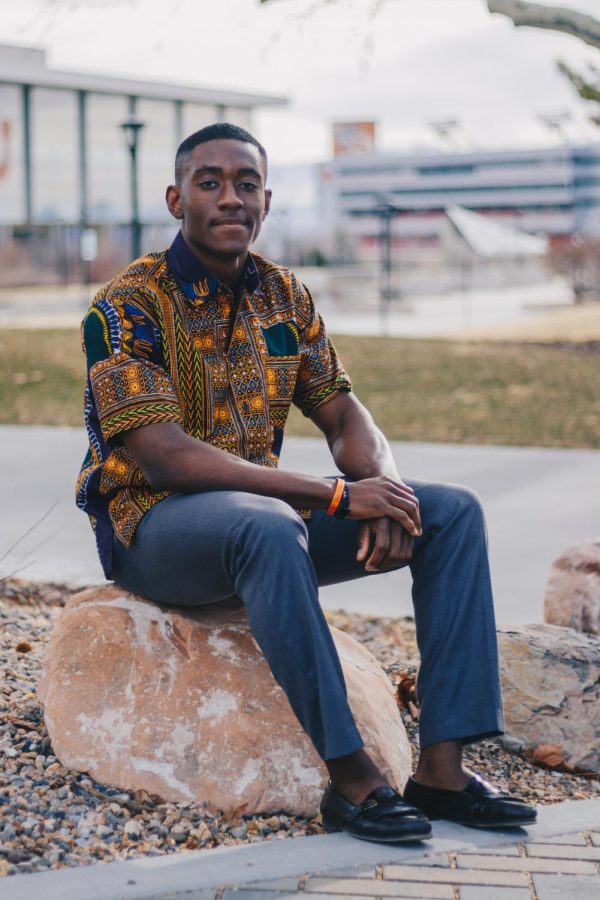
How the Kum Presidency Plans to Transform ASUU, and Get Students Like You More Involved
April 13, 2020
Every Associated Students at the University of Utah presidency has a finite amount of time to implement the plans and goals set forth in their campaign platforms.
After winning one of the most competitive ASUU elections in years, the Kum ticket — Ephraim Kum as president-elect, Michelle Valdes as vice president of student relations-elect and Ayana Amaechi as vice president of university relations-elect — plans to reinvent ASUU and its relationship to students.
Campaigning in a More “Competitive” Election
Four tickets initially announced their run for the ASUU presidency: Nasser, Kum, Hardenbrook and Madson. Madson’s candidacy was suspended and subsequently revoked by the ASUU Supreme Court less than a week into the election.
When the field was narrowed to three candidates, the primary elections were canceled and the focus turned to the general.
“We all had to step up this election cycle,” Kum said.
The Kum ticket’s platform revolved around one word: access. Their ticket was threefold: safety, affordability and connectivity.
“We chose what to run on based on student input,” Amaechi said. “We had a lot of awkward and uncomfortable conversations surrounding the issues that students have on campus to prevent them from succeeding. Once they were narrowed down, we found something they could all be tied back to — a lack of access.”
“All of the tickets had the same end goals,” Valdes said. “We all care about the U and the student body.”
Kum praised the Hardenbrook ticket for its detailed knowledge of the budget process at the U and the Nasser ticket’s mindfulness of community.
After the election results, all tickets, including Madson, were invited by the Kum ticket to meet and discuss strategies to implement the strengths of each campaign into Kum’s presidency.
What the Kum ticket thinks set them apart, though, was their connection to students.
“We had to focus on what we were doing more than anything else,” Kum said. “With competition, it’s really easy to get flustered and hung up on what other candidates are working on or saying,” he said. “I didn’t follow any of the other tickets on my personal Instagram page. We wanted to focus on our message and its impact on students.”
(Photo by Mark Draper | The Daily Utah Chronicle)
The Power of The Presidency
All actions taken by any ASUU member, from the president to an assembly member or an auxiliary position, must comply with the rules set forth in the Redbook — ASUU’s Constitution.
The president of ASUU is specifically given certain powers, such as the ability to appoint justices to the Supreme Court, represent the U at university events and serve as a voting member of various organizations, including the Board of Trustees and the Academic Senate.
Kum believes his role as a voting member on the Board of Trustees is one of his most important duties. The Board governs the U and is made of 10 members — 8 who are appointed by the governor and approved by the Utah Senate, the president of the University of Utah Alumni Association and the president of ASUU.
“This election is an extremely great opportunity to let some of the most important people at our institution know what students want,” Kum said.
He sees the flexibility within and the variety of his roles as an opportunity to make a big impact during his year-long presidency.
“Time is the biggest restraint on everything,” he said. “If it doesn’t go against the Redbook and it can be done within a school year, it’s probably doable.”
A “Crazy” Idea for Meal Plans
Kum has taken that idea of what is doable to heart. His two big goals center around meal plans and a campus-wide tour.
Traditionally, students pay upwards of $1,800 per academic year for various meal plans on campus. Some plans, like the Block 10 or 75, limit the total amount of meals students can eat on campus — at the Peterson Heritage Center or elsewhere on campus that accepts meal transfers.
Kum is frustrated by these limitations, especially for students who have dietary restrictions.
“Yes, we purchase meal plans from the school, from Chartwells, but they’re still supposed to be there to serve us, as students,” Kum said.
In response, the Kum ticket seeks to overhaul the current system, instituting unlimited meal swipes at the U and rid certain dorms like Sage Point, Chapel Glen and Officers Circle of their meal plan requirements.
“It’s the craziest thing we want to do,” Kum said.
Still, Valdes and the rest of the Kum ticket think it’s possible.
“As part of the presidential intern program this year, we went on a comparative learning trip for higher education, where we visited other college campuses,” Valdes said. “We visited USC, and we looked at their meal plan system. All their packages have unlimited swipes and it seems to be a growing, nationwide trend.”
“It saves universities a lot of money and prevents students from going into the starvation mindset. We think the U will be excited about it when they see how much money it saves them, in terms of food waste,” Valdes said.
For the Kum ticket, revamping the meal plan program meets their access to safety and affordability goals promised in their campaign.
Though nothing has been set in stone as far as plans, “we have negotiating power with HRE,” Kum said. “We represent the student body.”
(Photo by Mark Draper | The Daily Utah Chronicle)
Flipping the System to Sustainability
Even if these big goals are met, ASUU has high turnover. Every year, every seat is up for election. New presidencies fill the executive branch and so do new goals and plans. Kum hopes that his presidency will lay a foundation to fill the information silos.
“The tricky thing about all this change is that we have to put systems and infrastructure in place that’s sustainable,” he said. “So, even when we’ve graduated, the processes still function. It’s these foundations and relationships that we’re focusing on.”
Kum wants to use his presidency to amplify the student-voice instead of talking over it.
“Everyone wants something different out of their college experience,” Kum said. “I know that not everyone wants to be as involved in ASUU as us. We’ve decided that the best way to understand what students are thinking, and their different perspectives, is to actually go out to them, through a presidential tour of sorts.”
The president-elect plans to kick off the “presidential tour” this summer, meeting with different departments and resource centers while most students are off-campus.
Once the fall 2020 semester begins, Kum and his vice presidents will start sitting down with members of various campus organizations and student groups.
“I’m not asking them to come to me. I’m coming to them to do what we did while we were campaigning — talking to students about their barriers and things they’d like to see changed,” he said. “It’s all about improving their access.”
When asked what groups Kum thought were the least represented in ASUU, Kum sighed.
“I could scroll through Campus Connect and just go through each of the directors,” he said.“We are keeping in mind the most marginalized and disenfranchised groups of people on campus. Personally, I don’t recall seeing many ASUU people at a Black Student Union meeting, ever.”
Kum is cutting down on his class load significantly in the fall semester in preparation. The presidency plans to hold most of their meetings with student groups in the first two months of the semester.
Representation and Transparency
Kum, Valdes and Amaechi have all served in ASUU for at least one year prior to their campaign and referenced the subsections of campus represented in the governing body.
According to Kum, he will be the third black president and first Ghanaian-born.
Encouraging student involvement within ASUU, and, primarily, boosting minority power and representation, is important to their overarching goal of “access.”
“Part of the issue is that ASUU’s strategy for recruitment and involvement has been passive: let’s keep our door open, physically and ideologically,” Kum said.
“That’s — I mean, it’s better than the door being closed — but for us, access is opening the door, but it also means moving it closer to people, going out and bringing people over,” he said. “The door being open is useless if people don’t know where it is, or worse, if there’s a wall in front of it.”
The Kum ticket plans to leverage their past experiences and connections on campus to make more students feel comfortable even just stopping by the ASUU office.
“I think that us being in office alone might be a good step toward bringing down the stigma of only certain people can be in ASUU.”
Outside of this, Kum plans to adopt a more active approach to recruitment and involvement.
“We have to go outside of ASUU and find ways to make students aware of what’s going on,” he said. “This means having student organizations announce events, elections and the legislation being debated in their communities, or professors bring it up to their classes in person or even through Canvas.”
This is also how Kum plans to address one of his biggest concerns, student access to the budget for the 2020-21 academic year.
“We need to approve it soon, and I’m worried that no students will get to see it before it’s passed,” Kum said. “It’s all of the money that we’ll have access to in the coming school year, and students should have a say in how it’s spent.”
A new version of ASUU’s website was released on March 5, 2020 and announced on the current ASUU president Anna Barnes’ Instagram story.
The Kum ticket was excited about the greater ease of access on the website but still thinks that the U could do more.
“This [revamp] should alleviate some of the issues,” Amaechi said. “However, we were playing with the idea of incorporating an app-based database with information galore: from where your classes are, to who built that building, we’re hoping to provide students with easy and accessible information.”
As the Kum ticket looks forward to its year in office, their main focus is student relationships.
“We’re looking to flip the ASUU narrative,” Kum said. “I hope that the student reading this feels like they can walk right into the ASUU office and strike up a conversation with me, attend a meeting, run for office. I’m grateful for this chance to stand up for students. Come by, talk to me about your day, and say hi.”





Nahum Tadesse • May 16, 2020 at 11:36 pm
Amazing article! Jacqueline did a great job interviewing Mr. President Ephraim Kum. I’m very excited to see what changes are incorporated with this next school year 🙂